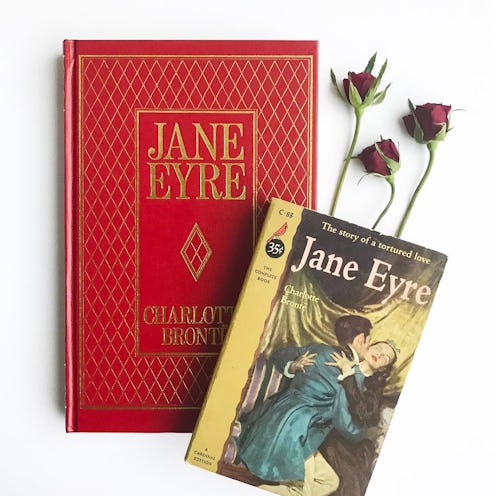Books
9 Classic Books That Are Actually Way More Subversive Than You Thought
When we think about classic literature, we generally think about high school English. Or dusty, leather bound volumes on a shelf. Or films starring Keira Knightley. We generally don't think about subversive politics. But classic works of literature are still around for a reason: they made an impact. They changed the world. Or, at the very least, they were popular enough to ruffle a few feathers and be widely banned in multiple countries. Here are a few classic books that are far more subversive that you might have thought.
To be clear, these books were all subversive for their time. Not all of them are as shocking as they once were. These days, the idea of a female protagonist or a frank depiction of sexism or a book advocating for the rights of agricultural migrant workers is... sadly, still pretty controversial in some sectors. So you can imagine just how revolutionary these books were when they first came out. From dangerous political ideas buried in a story about dogs, to the book that re-shaped our cultural conception of Christmas, these books all subverted the norm in one way or another. Check them out for a taste of old school revolutionary reading:
'The Wizard of Oz' by L. Frank Baum
In 1928, The Wizard of Oz was widely criticized and banned in all public libraries for “depicting women in strong leadership roles.” We may now think of Dorothy Gale as a typical, adventurous kids' book protagonist, but back then she was considered a subversive feminist radical, along with Glinda and the Wicked Witch of the West.
'The Call of the Wild' by Jack London
The Call of the Wild is a fairly straightforward story about a pampered pet dog who gets a job pulling a sled out on the frigid tundra. But that was enough to get The Call of the Wild banned in Yugoslavia and Italy and burned by the Nazis in 1933 due to its socialist undertones. I guess... because the dog turns his back on the bourgeois lifestyle of a housepet?
'The Color Purple' by Alice Walker
The Color Purple won the Pulitzer Prize, but that wasn't enough to stop the book from being repeatedly banned due to its “troubling ideas about race relations, man's relationship to God, African history, and human sexuality.” The troubling ideas being that... racism and sexism are bad and damaging? The book is still challenged in schools today, despite being considered a classic.
'The Grapes of Wrath' by John Steinbeck
The Grapes of Wrath is thought of as a canonized American classic, but back in the day it was filthy social commentary. John Steinbeck wanted to show the plight of migrant workers in America, with the hopes of spurring social change. Some people were so furious at the idea of workers having rights that they burned the book publicly and sent death threats to Steinbeck at home. But The Grapes of Wrath also had its fans, and migrant conditions did begin to improve after widespread public outcry.
'Wild Swans' by Jung Chang
Wild Swans is a biography and autobiography, telling the stories of three generations of Jung Chang's family in 20th century China. And it is still banned in China today. Despite being a nonfiction blend of memoir and verifiable history, the record of Mao’s impact on China was considered subversive by authorities. Chang herself is only allowed to visit her Chinese relatives under supervision.
'Jane Eyre' by Charlotte Brontë
Nowadays, when we think about politics and Jane Eyre, we think of the (extremely valid) critiques of the way the novel treats the "madwoman in the attic." But when Jane Eyre was first published, the novel was considered edgy for an entirely different reason: it portrayed a self-reliant young woman. The idea of the female lead of a romance novel dumping her guy because she loves herself and that's enough for her? That was unheard of. Plus, first person narration in a book written by a woman was extremely saucy and even scandalous.
'The Three Musketeers' by Alexandre Dumas
To be fair, The Three Musketeers probably wasn't intentionally subversive. But the stories of D'Artagnon and co. consistently show those in power as more inept than the men who work for them. And Alexandre Dumas' enormous, worldwide popularity was also pretty unintentionally subversive: some of his contemporaries resented his success due to his black Haitian heritage. Dumas went right ahead and became the most famous Frenchman in the world anyway, with or without their approval.
'Candide' by Voltaire
Candide may be the only book on this list to be banned due to sarcastic pessimism. Voltaire's magnum opus was considered to be blasphemy for taking an overall sarcastic tone, and suggesting that this reality we live in might not be the "best of all possible worlds."
'A Christmas Carol' by Charles Dickens
A Christmas Carol may seem heartwarming, but it was actually a hugely subversive piece of writing that more or less created Christmas. I mean, yes, of course Christmas existed before Charles Dickens wrote the book. But the cultural focus at the time was more on the religious ceremony. The idea of Christmas being a humanitarian holiday centered around giving gifts and families feasting together was largely from Dickens' own, personal idea of what the holiday should be. So anyone complaining about how "commercial" Christmas has gotten should blame Ebenezer Scrooge for bringing back the secular side of the festival.
